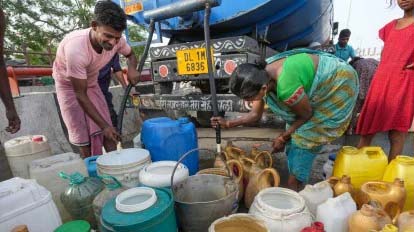Amidst the scorching heatwave, the Supreme Court emphasized the plight of Delhi’s citizens, urging swift action to address the water supply issues. The court directed the Centre to convene a meeting involving all stakeholders to discuss Delhi’s urgent demand for additional water from Himachal Pradesh via Haryana.
During the proceedings, Justices Prashant Kumar Mishra and KV Viswanathan questioned the absence of a joint meeting among stakeholders. Representing the Delhi government, Senior Advocate AM Singhvi pressed for immediate release of surplus water from Himachal Pradesh through the Wazirabad barrage, suggesting a temporary arrangement lasting at least a month. Recognizing the urgency, the bench stressed the need to ensure Delhi residents don’t suffer amidst the water scarcity aggravated by the heatwave.
Solicitor General Tushar Mehta, representing the Centre and Haryana government, acknowledged the water supply challenges but emphasized the role of the Delhi government in addressing certain issues, pointing out significant losses due to leakages and the presence of a tanker mafia.
Advocating for a collaborative approach, the bench proposed a non-adversarial meeting among the concerned state governments to address the water supply issue. While Mehta highlighted the ongoing consideration by the Upper Yamuna River Board, Singhvi underscored the immediate need to maintain water levels at the Wazirabad barrage.
Following deliberations, the bench scheduled a meeting of the Upper Yamuna River Board for June 5 to tackle the water crisis in Delhi effectively, with further hearings slated for June 6.
The apex court was addressing a plea by the Delhi government, seeking Haryana’s cooperation in releasing surplus water from Himachal Pradesh to alleviate the capital’s water crisis exacerbated by the soaring temperatures.
The plea emphasized the unprecedented demand for water due to the extreme heatwave, leading to a full-fledged water and sanitation crisis in Delhi. Filed by water minister Atishi, the petition highlighted the violation of basic human rights, particularly access to clean drinking water, guaranteed under Article 21 of the Constitution, amidst the ongoing water shortage and escalating temperatures.




